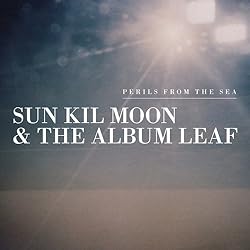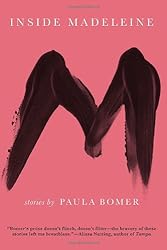« older | Main Largehearted Boy Page | newer »
July 22, 2015
Author Paula Bomer Interviews Musician Jimmy LaValle of The Album Leaf
In the "Largehearted Boy Cross-Media Cultural Exchange Program" series (thanks to Jami Attenberg for the title), authors interview musicians (and vice versa).
Paula Bomer is a author, her most recent book is the short story collection Inside Madeleine.
Jimmy LaValle records and performs as The Album Leaf. His most recent album is Perils from the Sea, a collaboration with Sun Kil Moon.
Author Paula Bomer interviews Jimmy LaValle of The Album Leaf:
"The Album Leaf is the solo project of Jimmy LaValle, a San Diego-based songwriter who began recording solo material one year after forming the post-rock band Tristeza. Inspired by a number of genres -- classical, jazz, and post-rock among them -- LaValle constructed his own songs in a similarly eclectic manner, utilizing everything from ambient noise to field recordings to radio transmissions." From All Mike DeRanco, Music Guide
Paula Bomer: I discovered The Album Leaf because of his collaboration with Mark Kozelek, resulting in the album, Perils From The Sea. I was taken by that album, because while lyrically very much in line with Kozelek's recent lyric writing, musically it seemed a real departure for Kozelek. And so I started listening to The Album Leaf, to try to understand the collaboration. Since then, I've spent the past few weeks listening to all of his many albums, including In a Safe Place, Into the Blue Again, One Day I'll Be On Time, as well as his collaboration with Bright Eyes. Jimmy played in Brooklyn last week and I unfortunately missed being able to talk to him in person, but he were kind enough to answer some of my questions via email.
I posted your bio taken from All Music Guide, where it describes your music as a result of a mix of influences ranging from "classical, jazz, and post rock among them". While I don't dispute this, I wanted to throw out some adjectives and words to see how you get your reaction to how they work to describe your music. Maybe, think of this as word play game.
Ethereal
Jimmy LaValle: I agree with this. i like to create a lot of space in my music.
Bomer: Soothing
LaValle: I've often heard this word used to explain the feeling my music has on people.
Bomer: Melancholy
LaValle: I'm definitely guilty of a good melancholic melody. but it's not ever on purpose.
Bomer: Contemplative
LaValle: Sure. Can make you think.
Bomer: Mourning
LaValle: I'm not inspired by death or loss. But I can see people using my music to cope, heal or forget/forgive.
Bomer: Talk to me about the titles of your songs. Is it challenging to title songs that have no lyrics? How do you come up with words to music that have no words? And which comes first, the title, or the words to describe the music, or the music itself? Do actual words go through your mind while creating the lyric-free music? Maybe these are banal process questions, but I'm a writer who listens constantly to music and the relationship between music and words is mysterious and interesting to me.
LaValle: 80% of my music is instrumental. Yes, The titles are usually words or phrases that most of the time, have nothing to do with the song. Sometimes they do, sometimes there was a mood I was in, or I was thinking of a situation, or something that happened while writing the song. But most times, there is no relation. after the titles happen, and things are finalized. the titles then start to develop a relationship to the song in my mind. I can start to connect the dots and establish a connection to the titles and music. The music is always first for me, never the other way around. You mentioned the collaborations with Mark Kozelek and Conor Oberst (Bright Eyes) above, in both of those collaborations, I wrote the music for them which they then sang on. I've never written a piece of music to lyrics or vocals.
Bomer: Why do you think you primarily write music without words and when does a song seem to want or need lyrics or not? I'm wondering if it's random or there is a personal reason or meaning for how you come to know if it's going to be instrumental or not? That perhaps the aesthetic comes from something beyond artistic choice, from somewhere emotional or elsewhere.
LaValle: This is obviously a question I am asked a lot. To get deep into it, I was in a band before this, and I was going to sing for that band. We spent a lot of time writing music, developing what we wanted to do and had a show to play before we had the vocals ready. So we played the show with no vocals. Afterwards, when we went to add vocals, my bandmate told me he didn't like my voice. That scarred me and sat with me for a long time. I was very frightened of singing. I've never been a singer and I don't consider myself a singer and will never consider myself a singer. I sing, yes. But I am not a singer. When I was making "in a safe place" I wanted to push myself and get out of my comfort zone and challenge myself. So what better way than to overcome my fear of singing? So I did. It's a brutally honest vocal on that record and I still only sang one song on that record. I do backing vocals on the others.
Moving forward, I just started to hear vocals on certain songs. "Always for you" was always a song I was going to sing on. At other times, Pall Jenkins, who I collaborate with vocally and lyrically, will hear a song and hear a vocal melody so we go for it. It's really a song by song basis. If there's room for a vocal, I'll try it, if there is not, and I feel the melody is strong, it stays how it is.
Bomer: When you made the album with Mark Kozelek and collaborated with Bright Eyes, how did you work out the recording of the music with Kozelek's lyric heavy approach? How did that differ from working with Bright Eyes' very different lyrical style?
LaValle: I touched on this above. With Conor, I just had a couple acoustic songs that I had been written that were not going to be Album Leaf songs and when we decided to collaborate, I sent him those songs. But with Mark, I didn't think about his lyrical approach. I would just focus on the music side for me and what I wanted to do that was different. I would just try to do something that I wouldn't do in Album Leaf musically. I focused on it being synth heavy while also using a handful of old vintage drum machines I had recently picked up. I limited myself to 4 or 5 instruments and just tried to create simple songs based on that. I always write with a verse/chorus/verse/chorus/bridge/chorus or whatever formula in mind. So I would just try to guess, melody wise, what he might do. It always surprised me. I hadn't listened to his music since Red House Painters so I wasn't aware of his new vocal approach he had been using over his previous records. It was cool and surprised me. I really love that record and what we created. It's really a shame that we've never played it live.
Bomer: How would you describe your audiences? How do they differ in different parts of the country, or the world?
LaValle: My audience is very diverse and I love it. The age range is anywhere between 0 & 80. No joke. I've had 7 year olds at shows before, arriving with their parents who are also fans and have played the music for their children. I've received audio recordings of 2 year olds singing "Always For You". I've played shows were there are older people in the audience that approach me saying they found me on Pandora or any other streaming services. People who have discovered me from TV shows like Scandal. Its great. I really appreciate the different ages, backgrounds and demographics my fan base have. I am happy to not cater to a specific kind of person.
Bomer: How did you come to dedicating yourself to making music? How did you find each other?
LaValle: I've been playing and creating music since I was a child. It's all I've ever done. So I don't really know anything else and couldn't answer the question because I don't know what not playing music is like.
Jimmy LaValle and The Album Leaf links:
The Album Leaf website
The Album Leaf Wikipedia entry
Paula Bomer links:
also at Largehearted Boy:
other musician/author interviews
Antiheroines (Jami Attenberg interviews comics artists)
Book Notes (authors create playlists for their book)
guest book reviews
Note Books (musicians discuss literature)
Soundtracked (directors and composers discuss their film's soundtracks)







